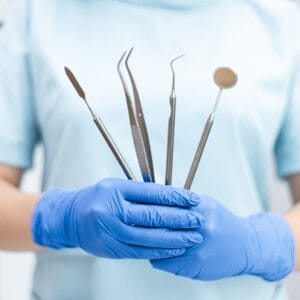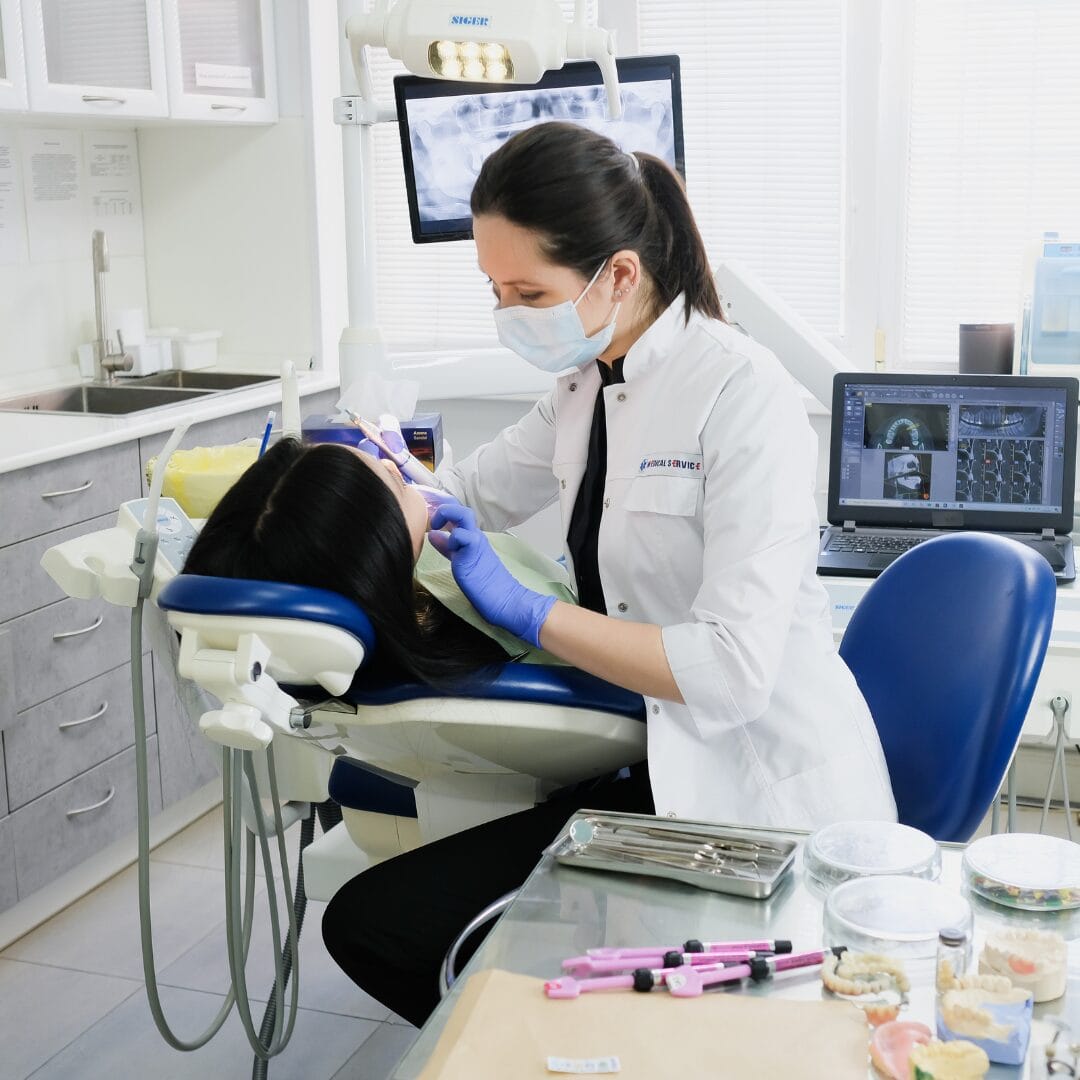
A big part of the appeal of working as a locum tenens dentist is its flexibility—a perk that provides you with the opportunity to travel around the country. As with all other medical providers, locum dentists must have the appropriate state license to practice in that state.
When you work with Barton, we’ll take on the licensing and credentialing logistics and expenses, but it’s still helpful to have a handle on the licensing requirements of each state.
Fastest States to Get a New Dental License
Most states make it fairly easy to get a dental license in multiple states to avoid the challenges caused by staffing shortages and a lack of access to necessary dental care. In several states, the process takes less than two months.
NOTE: This timeline specifically refers to dentists who already have a license in one state and are looking to get a license in another state. All dentists who wish to practice in the United States must first graduate from a dental education program accredited by the American Dental Association Commission on Dental Accreditation (CODA), or an Advanced Standing Education Program. No state on the following list requires providers to have a Professional Background Information Services (PBIS) report.
States You Can Get a Dental License in Under 4 Weeks:
- Vermont
- Utah
- Requires Controlled Substance Registration (CSR)
States You Can Get a Dental License in Under 8 Weeks:
- West Virginia
- Requires Fingerprinting
- Rhode Island
- Requires Controlled Substance Registration (CSR)
- New Jersey
- Requires Controlled Substance Registration (CSR)
- New Hampshire
- Nevada
- Requires Fingerprinting
- Requires Controlled Substance Registration (CSR)
- Maryland
- Requires Controlled Substance Registration (CSR)
- Iowa
- Requires Fingerprinting
- Requires Controlled Substance Registration (CSR)
Accepted Exams:
Here are the accepted exams for each of these nine states:
- West Virginia: CDCA, CITA,CRDTS, SRTA, WREB
- Rhode Island: CDCA, CITA
- New Jersey: CDCA, CITA
- New Hampshire: CDCA, CITA, CRDTS, SRTA,
- Nevada: CDCA, CITA
- Maryland: CDCA, CITA
- Iowa: CDCA, CITA,CRDTS, SRTA, WREB
- Vermont: CDCA, CITA,CRDTS, SRTA, WREB
- Utah: CDCA, CITA,CRDTS, SRTA, WREB
Best States to Get Your Dental License in 2025
While there are a few states where you can get a dental license within weeks, these aren’t the only places you should be looking for locum tenens dentist jobs. In fact, we’ve seen extremely high demand for locum tenens dentists in the following states (and one even has a less than eight-week turnaround on new licenses):
1. Iowa
On our list as a state in which you could obtain a dental license in under eight weeks, Iowa has been one of the hottest states for locum tenens dentists in 2025. The Hawkeye State is a great destination for those who want to travel to the Midwest—especially during the summer.
Iowa City is the perfect place for people who want to experience some more hustle and bustle, as the state’s capital is a bustling college town with a vibrant nightlife and plenty of dining options. If sports or outdoor activities are more your speed, Iowa is home to the Field of Dreams baseball field in Dyersville, and the High Trestle Trail Bridge is a great hiking option that spans the Des Moines River.
As for scope of practice, dentists in Iowa have full practice authority, which allows them to perform a wide range of dental procedures without requiring a referral. Dentists also qualify for medical staff membership in Iowa, however they must meet certain conditions such as holding a valid license, completing an accredited residency program or equivalent, be board-certified, and be in good standing with the state’s dental board.
Check out our open locum tenens dentist jobs in Iowa!
2. Minnesota
Minnesota has been a popular destination for locum tenens dentists, offering opportunities in both urban and rural settings. The North Star State provides a unique blend of natural beauty and city amenities, making it an attractive option for dental professionals seeking diverse experiences.
The state capital, St. Paul, offers a mix of historical charm and modern attractions. Visitors can explore the Minnesota State Capitol building or enjoy the city’s numerous parks and green spaces. For those interested in culture and entertainment, the Minneapolis Institute of Art showcases an impressive collection of artwork from around the world.
In terms of dental practice, Minnesota offers a favorable environment for professionals. Dentists in the state are given full practice authority, meaning they can perform dental procedures without supervision or a referral. Dentists in the state also have unlimited and independent prescriptive authority.
Check out our open locum tenens dentist jobs in Minnesota!
3. Missouri
The Show-Me State has been drawing locum tenens dentists with its unique blend of Midwestern hospitality and diverse practice settings. From bustling urban centers to serene rural communities, Missouri offers dental professionals a chance to experience varied work environments and lifestyles.
St. Louis, the largest city in Missouri, is home to numerous attractions including the iconic Gateway Arch, the St. Louis Zoo, and the Missouri Botanical Garden. For nature enthusiasts, Missouri’s Lake of the Ozarks presents a perfect weekend getaway, with its expansive shoreline and numerous recreational activities.
Missouri’s dental landscape is particularly appealing for locum tenens dentists looking for work. Dentists in the state have full practice authority, so they can prescribe medicine and make clinical decisions independently without direct supervision.
4. North Carolina
North Carolina has become an increasingly popular destination for locum tenens dentists, offering a unique blend of coastal charm and mountain majesty. The Tar Heel State provides dental professionals with diverse practice settings, from bustling urban centers to picturesque rural communities.
For those seeking outdoor adventures, North Carolina boasts an impressive range of natural attractions. The state is home to the Great Smoky Mountains National Park, offering breathtaking views and hiking trails. On the eastern side, the Outer Banks provide miles of pristine beaches, perfect for relaxation or water sports. Between assignments, dentists can explore the state’s rich history at sites like the Wright Brothers National Memorial in Kitty Hawk.
Like most other states, North Carolina gives full practice authority to dentists, making it a solid choice for locum tenens providers looking to work in a new part of the country. They also have independent and unlimited prescriptive authority in the state.
5. Ohio
Ohio has become an attractive destination for locum tenens dentists, offering a diverse range of practice opportunities across its urban centers and rural communities. The Buckeye State provides a perfect blend of Midwestern charm and modern amenities, making it an appealing choice for dental professionals.
Columbus, the state capital, offers a vibrant urban experience with its thriving arts scene, world-class museums, and exciting sports culture. For those who enjoy outdoor activities, Ohio boasts beautiful natural attractions such as Hocking Hills State Park, known for its stunning waterfalls and scenic hiking trails. Between assignments, dentists can explore the Rock and Roll Hall of Fame in Cleveland or visit the National Museum of the U.S. Air Force in Dayton.
Ohio also gives its dentists full practice authority and unlimited and independent prescriptive authority, making it a great place for dentists to start or continue their locum tenens careers.
Explore our locum tenens dentist opportunities in Ohio!
6. Wisconsin
Your Dental Licensing Questions Answered
Have other dental licensing questions? We’re here to help!
What are the Best States to Practice Dentistry?
There’s no one correct answer to this question—each state has its own pros and cons, and everyone needs a dentist! If you are a licensed dentist looking to switch gears and work in a different area of the country, however, you might want to consider taking a job in the 14 states we outlined above: West Virginia, Rhode Island, New Jersey, New Hampshire, Nevada, Maryland, Minnesota, Missouri, North Carolina, Ohio, Wisconsin, Iowa, Vermont, and Utah. That’s because, as we explained earlier, there’s a very quick turnaround when it comes to obtaining a license to practice in these states when you already have a license.
Can You Have a Dental License in Multiple States?
Yes! You must have an active dental license in the state in which you are currently operating, but this does not invalidate or negate any existing licenses you already have. This is especially important for locum dentists, who may practice in multiple states within a single year.
What States Have Dental License Reciprocity?
Recently, advocacy groups have finalized the Dentist and Dental Hygienist Compact, and as of March 2025, 10 states have enacted the Dentist and Dental Hygienist Compact legislation: Colorado, Iowa, Kansas, Maine, Minnesota, Ohio, Tennessee, Virginia, Washington, and Wisconsin.
Licensing for Foreign-Trained Dentists: An Overview
Unfortunately, it’s much easier to transfer dental license credentials to another state than it is from another country. Almost all requirements for U.S. dentists are built on national guidelines. It is not the same as starting from scratch, but it will likely require additional education and the completion of additional exams.
Which States Allow Foreign-Trained Dentists?
All states “allow” foreign trained dentists, but none offer an especially expedited process for licensed dental practice. Each state has its own additional legal or education requirements that may require extra hurdles for international dentists, but the biggest challenge for foreign-trained dentists is the requirement to have graduated from a program accredited by CODA, the United States’ accrediting agency for dentists.
How Does a Foreign-Trained Dentist Get Licensed in the U.S.?
The first thing foreign-trained dentists must understand about the U.S. is that requirements for dental licensure vary from state to state. However, there are a few common requirements each state shares.
First, foreign-trained dentists seeking to practice in the U.S. must first graduate from a dental school accredited by CODA. If a foreign-trained dentist does not have a degree from school accredited by CODA, they can instead apply to a CODA-accredited dental education program. These advanced standing dental education programs are designed for foreign-trained dentists with previous education backgrounds, allowing them to earn a D.D.S. or D.M.D. in two to three years.
In addition to education requirements, foreign-trained dentists must pass the Integrated National Board Dental Examination (INBDE), a standardized written exam required by all dentist licensing boards in the country.
Following successful completion of education and written exam requirements, foreign-trained dentists may need to also complete a clinical examination, however specific requirements vary depending on the state.
Limited Dental License States
Minnesota is different from the other 49 states in that it offers a limited dental license for foreign-trained dentists. Foreign-trained dentists in Minnesota can apply to work under the supervision of another dentist for three years without any additional training before applying for a U.S. dental license.
WANT TO LEARN MORE ABOUT LOCUM TENENS WITH BARTON ASSOCIATES? TALK TO ONE OF OUR REPRESENTATIVES!
Editor’s Note: This blog was originally written in 2021 by Chris Keeley. It has been updated to reflect relevant guidelines and additional content as of October 2023, and again in March 2025.
